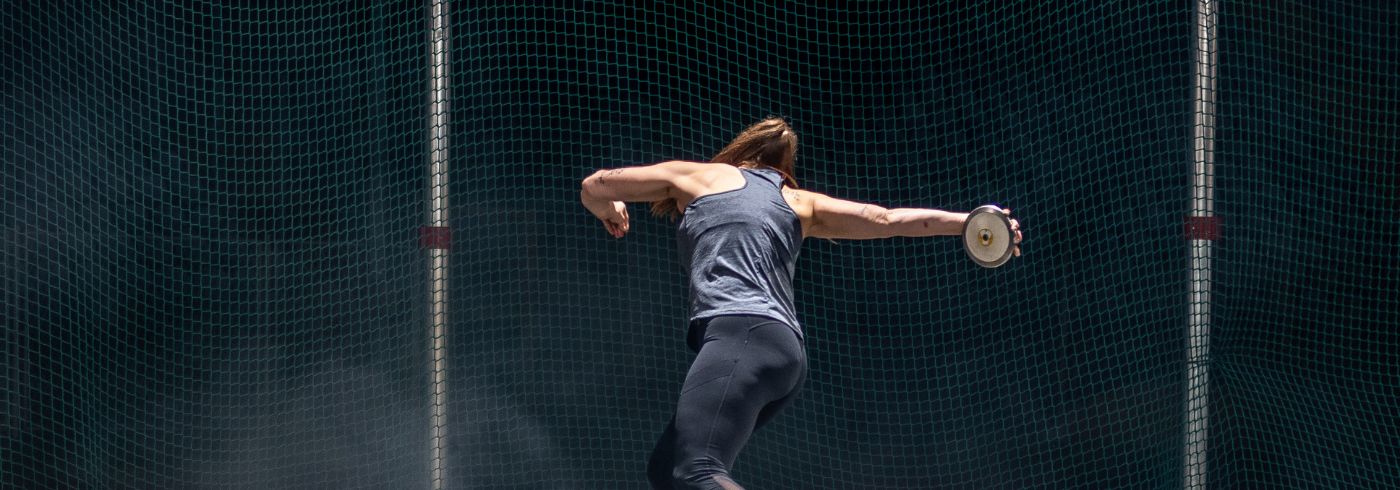
Delving Into Discus Throw: Preparing for Competitions
BY JOSH DOUGLAS
Welcome to my latest blog for Neuff, where I will be discussing how you can get competition ready in discus throw.
Whether you're a seasoned athlete or a newcomer to the sport, preparing for competition can be both thrilling and challenging. With that being said, I'll delve into the essential aspects of getting your head around competing, offering insights on how to mentally prepare for the big day.
We'll also explore effective strategies for dealing with nerves, helping you stay calm and focused when it matters most. Finally, we'll share tips on achieving personal bests (PBs) in competition, so you can continuously push your boundaries and reach new heights.

Getting your head around competing
Depending on the format and level of competition you’re competing at, the number of attempts you have can vary.
Some competitions only permit four attempts, others you get three and then top eight throwers get a further three, or if you're really lucky (or at an open competition) you get a straight six.
Regardless of how many throws you get, competing can be a very stressful experience. Whether it's an open, a county champs or even a national/international level competition, the feeling of stress will most likely always be there.
And whilst some degree of stress is good, for some it can be detrimental if it's too much, or unmanageable. For this reason, I will be presenting a few ways in which you can reduce the amount of pressure you place on yourself in the hopes that a few of you have a smoother time competing.

Strategies for dealing with nerves
There are things you can do the week before competing to ensure you've taken as much pressure off of yourself as possible, such as the following...
Do NOT over-train
As an U17, that was something I used to do a lot in the lead-up to a “major” competition. I would take way too many throws and push myself way too hard. This resulted in me being tired on the day of the competition.
The best thing you can do is focus on quality not quantity. A day or two before the competition, have a “shake out” training session where you have a very limited number of throws 6-12, making them high quality and technically focused. This session is used to build confidence but also remember that if the distances aren’t great, the adrenaline will often add a few more metres if used correctly.

Have your bag ready
There's nothing worse than getting to the venue you're competing at only to realise that you've forgotten your vest, spikes or worse yet, your implements.
I tend to overpack rather than the alternative. Other than my implements and spin shoes, I also pack resistance bands, competition vests, clothes to travel home in, spikes, water and snacks. By having a list of things you pack and ensuring it is all there, you’ve already set yourself up well to have a stress-free time.
Get plenty of sleep
I can begin to count the number of times I've spent the night looking on social media at throwing and psyching myself up 12 hours before I even need to start competing.
Put the phone down, do something to relax before getting into bed and that will prevent you from staying up half the night worrying that you'll be too tired to compete.

Arrive promptly before the competition
Typically, it is advised you arrive nine minutes before warm up.
However, if you've got a long way to travel, I would recommend leaving around 30-45 mins earlier to allow for traffic or any service stops you might make. That way, when you arrive at the competition, you know you have ample time to warm up, check-in and get mentally prepared to compete.
Create a pre-planned warm-up
More often than not, athletes will do a completely different warm-up than they typically would when training.
During training, athletes may typically warm up with some standing throws, half turns or another variation of throwing. When competing, you aren't given that luxury. This change can often be the cause of athletes' nerves.
By planning your warm up and sticking to it, you'll be even less likely to start stressing out.
Start thinking about what the focus of your competition is
A lot of times (especially in my experience), messing around with cues and/or having too many cues has been the cause of a lot of stress.
By discussing cues before having to compete, you take a lot of mental stress off your shoulders. Talk to your coach prior about what you should be focusing on, that way the stress is taken away from you and you can focus on achieving those things. My recommendation would be to have no more than two or three cues.

Have a set number of warm-up throws
There's a chance you may be able to take a considerable chunk of pressure off yourself if you do this.
Throwers, especially novices or those in the younger age categories, place a ton of pressure on themselves for the warm-up throws to be perfect. In a less seasoned athlete's eyes, the quality of the warm-up throws dictates the entire competition.
Because of this, if an athlete is allowed to have four or more warm-up throws, they may become more frustrated with themselves. Alternatively, they may “win the warm up” but will have very little energy left for the competition.
Restrict yourself to at most three warm-up throws and focus on technique above all else. The only time distances that matter is when the competition starts.
Associate goals to each competition
Your goal could be to throw a certain distance, finish in a particular place, or simply to see if you can execute a certain cue under competition stress. This is where the previously discussed process vs outcome goals come into play.
In competitions, process goals and outcome goals can affect stress levels differently. Process goals, like achieving technical cues within the athlete's control, reduce stress by enhancing confidence and providing clear, actionable targets.
Alternatively, outcome goals, such as winning a medal or achieving a personal best, lead to a heavy reliance on factors outside of the athlete's control. This leads to increased anxiety and pressure.
If you focus on emphasising process goals, this may help to reduce the pressure of competing.

Employ mental strategies
More specifically, you can help manage your stress by using a technique called reframing.
Reframing is a way of changing how you think about something to feel better about it. Instead of focusing on the negative aspects of a situation, you find a different angle to see it in a more positive light.
This helps you feel less stressed and more in control. It's like putting a new frame around a picture to see it differently and more positively.
Reframing can help manage nerves in a discus throw competition by changing how you see and react to stress. One way is to think of your nerves as excitement instead of anxiety. This can turn the adrenaline you feel into something that boosts your performance.
Use your competitions as opportunities
Look at your competition as a chance to show off your skills and improve, not just as a test of your worth, which makes the event less intimidating.
Focusing on what you can control, like your technique, instead of worrying about winning, can also reduce anxiety. If you see mistakes as opportunities to learn rather than failures, you'll feel more positive and resilient.
Turn negativity into positivity
For example, instead of saying "I might mess up", replace this with "I am prepared and capable of throwing good distances".
This can boost your confidence and calm your nerves. Using these reframing strategies can help you manage stress better and perform your best in a discus throw competition.

Achieving PBs in Discus Throw
Now the bit you're really here for. How to achieve PBs in competition.
The truth is, there is no sure fire way to PB. If that were the case, everyone would be PB’ing every competition and that's simply not how it works.
What I can do, on the other hand, is to provide a few things to think about that will make you more likely to PB than if you didn't do them at all. I wanted this to be the longest part of the blog, but it boils down to some incredibly simple messages.
- Trust in your technique and stay committed to executing it.
- Throw at the fastest speed you can technically achieve (optimal not maximal).
- Stay as loose as possible. There's a reason our best throws can happen in warm-ups.
Trust me, I understand getting the safe throw in, but don't do it for the whole competition. By being constantly scared of failing, you run the risk of never putting your all into something. We've all had at least one throw that felt like it was “the one” and then CLANK. It hits the cage or it goes out of sector. Those throws aren't failed attempts, they are glimpses at your potential.

Be patient as you progress
By implementing the tips and techniques discussed in this blog, athletes can approach competitions with confidence, focus, and resilience. Remember, it's not just about the outcome, but also the journey of improvement and growth. So, stay dedicated, stay positive, and keep pushing your boundaries.
Best of luck in your future competitions, and may your throws soar higher than ever before!
About Josh Douglas

Joshua Douglas is a shotputter and discus thrower, who competes across the UK and is a high placing athlete in many of the events he participates in.
He is also currently undertaking an undergraduate degree in sport psychology, and is very passionate in helping other athletes in this area, as well as other areas in throwing and athletics!
Josh will mainly be talking about discus throw in his content. However, as he is studying sport psychology at university, he will also cover this area in his blogs where he can!
Joshua is a member of Southampton AC & Loughborough Students AC.
Instagram: @bigbjosh


Leave a comment